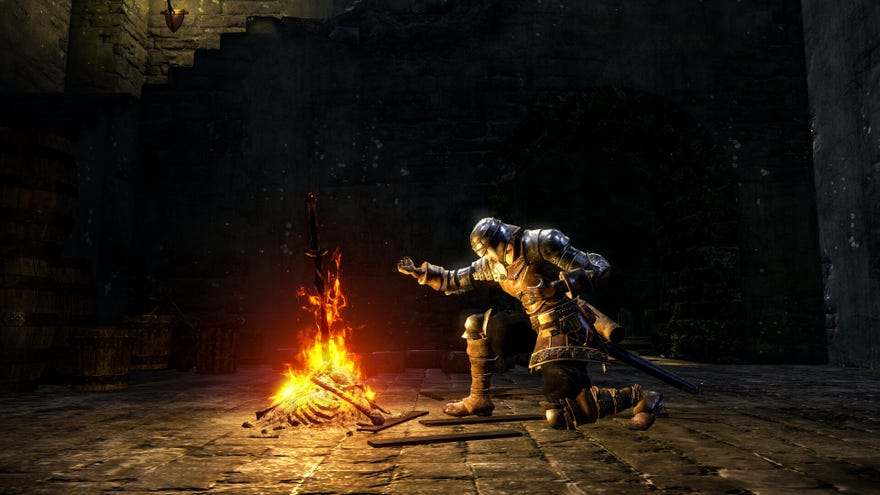The jolly co-operation of localising Dark Souls
“'Hollow' was a big one.”
Dark Souls begins by creating the universe. “In the Age of Ancients, the world was unformed, shrouded by fog,” intones the opening cinematic. “A land of gray crags, archtrees and everlasting dragons.” Those two sentences do a lot of heavy lifting. “We needed to conjure an image of the world in its previous static state, where concepts that we take for granted - the finite nature of life and all conceptual contrasts - were nonexistent,” says Ryan Morris, lead translator at Frognation, the Tokyo and London-based consultancy that has handled the majority of From's Souls or Souls-type projects, from the original Demon's Souls to this year's Elden Ring. “I think of the singularity that existed before the Big Bang.”
While series creator Hidetaki Miyazaki wrote the script for Dark Souls, the English version is full of terms and phrases Morris himself devised with Miyazaki's input and oversight: a handful have made their way back into the original Japanese. It was Morris who named the archtrees, for instance, rather than just calling them “giant trees”, and he who suggested capitalising “Age of Ancients”, breaking the timeline off into formal periods. He also shortened the line “the world was yet to be defined” to “the world was unformed”. Tiny details - but in a FromSoftware game, tiny details have long afterlives. Dark Souls players still argue about the nature and purpose of archtrees, with some suggesting that they are portals to neighbouring realities.
As the intro continues, fog gives way to fire - “and with Fire came Disparity. Heat and cold, life and death, and of course, Light and Dark. Then from the Dark, they came, and found the Souls of Lords within the flame.” “Disparity” is among the Souls words that haunts me the most, possibly because it sounds a bit like “despair”. It's one of Morris's favourites, too, marking the division of that primordial totality into warring pieces.
Fascinatingly, this division is mirrored in the act of translation. “The Japanese language does not state plurality as regularly as English,” Morris notes, “and so the Souls of Lords may have been translated as the Soul of a Lord, but the appearance of Nito, the Witch of Izalith, Gwyn, and the pygmy tells us that several actors discovered multiple Souls of Lords.” Thus, translating Dark Souls from Japanese to English can be said to perform the game's own creation myth. Moving between languages splits the one into many.
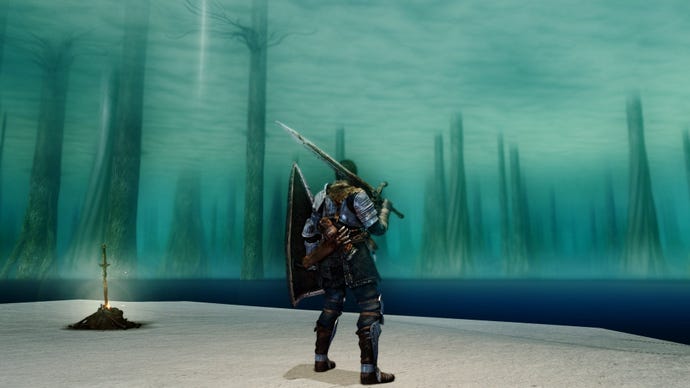
Localisation can be a weirdly formless trade - sometimes involving direct translation, sometimes closer to adaptation, bordering on full-blown collaboration with the creator. The Souls games are an especially complex and intriguing case, shaped as they are by Miyazaki's childhood curiosity about a language and a culture he didn't entirely understand. “He used to struggle through English fantasy books like Lord of the Rings in his youth,” Morris says. “He is really into western fantasy. And that's how he ends up making something like Demon Souls. It's his own take, but it's heavily inspired by western fantasy.” The most obvious symptom of this fascination is that while the early Souls games were written in Japanese, they are voiced exclusively in English, with British actors to suit the medieval setting.
Morris came to Japanese fantasy by similar routes, picking up the rudiments of the language as a teenager by translating his favourite anime films and mangas. “I learned Japanese quite intensely and I learned it all from pop culture. I was really good with colloquialisms and with fantasy and science fiction – I first got into Akira, then Ghost In The Shell.” After landing a job in general translation, Morris gravitated quickly to the games industry: Frognation hired him while he was still living in Seattle. “I wanted to do anything that I loved, which is any Japanese pop culture - could have been games, manga, or anime. But it turned out I found the most work in games.”
Originally a techno record label co-founded by author and businesswoman Lynn Robson, anime scriptwriter Dai Satō, and music journalist Kengo Watanabe, Frognation are now a boutique localisation outfit with credits ranging from Ace Combat to Ape Escape. Miyazaki heard about the studio from a mutual acquaintance at Sony during development of Demon's Souls. “I was on board from the beginning,” Morris says. It was no small undertaking - Morris worked with British and Japanese editors, but he was the only English-speaking translator for both Demon's Souls and Dark Souls, the games that launched FromSoftware to international fame.
“Solaire was clearly an earnest, ambitious man of faith with the purest of intentions, but he is also extremely socially awkward”
Translating anything from Japanese into English is a feat of “brain flexibility”, Morris says, because Japanese is such an unusual language. “Even English and Chinese are closer to each other than either is to Japanese.” For one thing, Japanese contains a lot of very specific wording “to signify your status relative to who you're speaking to, a lot of ways to pay respect and to skirt around an issue or to soften something”. English has equivalents for this, but they're much less poetic and subtle. “Japanese people very rarely say 'I' or 'you',” Morris says. “It's almost always implied, but it just sounds rather blunt, to say 'what do you want to do?' or 'do you want to eat this?' It doesn't sound cultured, or it sort of grates on the ears if you translate English like that literally.”
Questions of status are certainly important to Dark Souls' famously enigmatic NPCs, who range from princes and their courtiers to beggars and exiles. As a rogue Undead, recently escaped from asylum, the player is right at the bottom of the ladder; your sin, in the eyes of many bosses, is straying beyond your allotted station.
It makes for a pervasive grimness, but also, comedy. Take fan favourite Solaire of Astoria and his legendary catchphrase: “The sun is a wondrous body. Like a magnificent father! If only I could be so grossly incandescent!” The line is often cited as Souls writing at its most scintillating, which perhaps misses that it's a bit a joke about upper-class mannerisms. “The main point here is that Solaire was clearly an earnest, ambitious man of faith with the purest of intentions, but he is also extremely socially awkward,” Morris says. “His language had to indicate both a proper, knightly pedigree but also an aloof disconnect - a tendency to get lost in high concepts and visions of grandiosity. Monty Python made light of some deeply serious people, and perhaps it is no coincidence that Solaire appears to have borrowed from their wardrobe.”
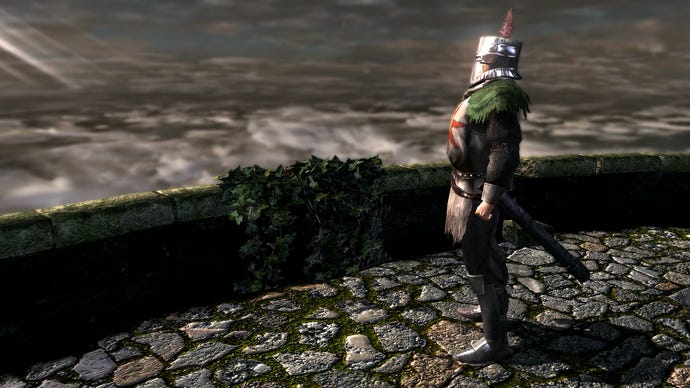
Lines like these came about through meticulous day-to-day conversation with Miyazaki, both remotely and in person at the recording booth. “For the last couple of games, it's probably in the high hundreds of individual questions, as we go through the dialogue and the item text lore especially,” Morris says. It was a delicate dance. “I view his texts as the scripture that needs to be translated, but you do have to come up with some strategies to add colour to the English, that would not come out over a literal translation. There are different strategies for kind of doing that. It's essentially conjured up from the way the Japanese makes me feel. It's not just conjured out of thin air.” (Morris likens localising to “conjuring” often; it's hard not to think of summoning in the game, whereby allies and adversaries are conjured up from names written on the floor.)
Another, more functional difficulty was blindness to context. Frognation didn't always know where in each game a line would occur, or even the exact identity of the person speaking. “Could this actually be a woman? We assumed it was a man. Could this place actually be right next door, in which case the language has to be slightly different? We thought it was far away. There's lots of little things like that where it could be interpreted two or more ways.”
Has this element of obstruction been at all advantageous, I wondered, in helping Frognation cultivate that famous Souls atmosphere of mystery? Not really. “We want to start with as much knowledge as we can and then choose how much ambiguity there is, how much to shroud things. We don't need that to be artificially induced by tough circumstances.” As regards its localisation work in general, Frognation sometimes have access to debugs that allow them to view text in situ, but it's safer and more efficient to get it from the source. “There isn't like a search feature on a debug session so you can go straight to where the item is. It would be very complicated to do that on your own - you're better off asking somebody.”
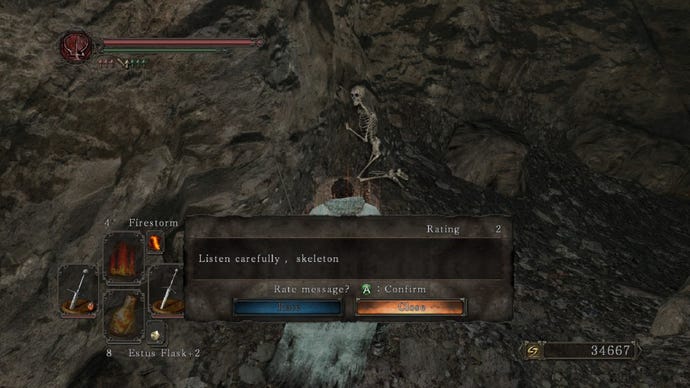
Miyazaki has incorporated some of Morris's more adventurous English translations back into the Japanese wording. Very infrequently, Morris has also been able to contribute some novel phrasing of his own – an unusual word choice, or a blend of two words where there isn't an exact equivalent in English, even the occasional piece of death dialogue, sugested if he'd built up enough familiarity with the character. “There are maybe 100 lines like that over the course of a couple of games.”
Morris is naturally wary of speaking on Miyazaki's behalf about many of these choices, not least to avoid spoiling the lore. “I know that he wouldn't want to define this or that - it's kind of a rabbit hole, I suppose, to start that conversation after the game is done. He also appreciates and enjoys the fact that players have taken so much time and energy, defining it on their own terms and coming to their own conclusions.”
He's prepared, however, to talk broadly about some of the trickier words, including a few that are fundamental to Souls mythology. “'Hollow' was a big one. You read the Japanese and then you read about what it means, and then there were so many possibilities, but very few that really seemed to work. It's one of those cases you're thinking about for days in the shower and on the train, trying to come up with something that will fit.”
'Humanity', by contrast, was “a very direct translation, [but] Miyazaki uses the term in a very unusual way.” Morris suggests that to play through Dark Souls is to participate in Miyazaki's redefinition of this word - establishing what it means to be human in relation to the duelling forces of Fire and Darkness. “After you've gone through enough of the story, it gels.” Similar things can be said of “demons” in Demon's Souls. “When I was first going through the script, the more I heard about demons, the more I wondered if the word was being used properly. And then over time, I realised that it was really a new take on what a demon is, [so] it didn't have to be changed in English - it's kind of an original concept. Using an old word for something new.”
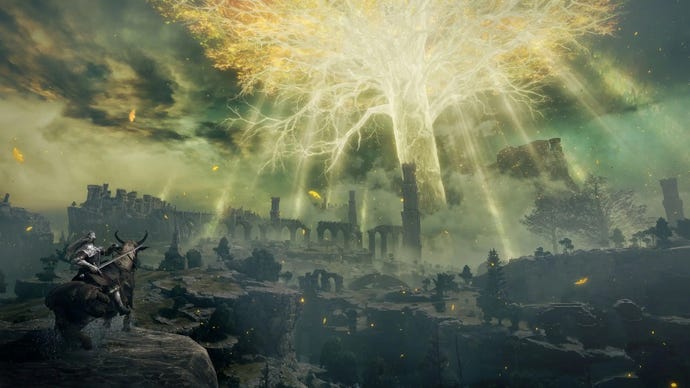
This ethos of redefinition also speaks to how Dark Souls players have approached the game's messaging system, fashioning a mixture of guidance, summon-bait, Humanity-begging, found poetry and innuendo from its sentence templates and vocab list. The compactness and pithiness of Souls has lent itself naturally to the realm of online memes and social media. Morris is pleased by the system's popularity, but he isn't entirely happy with his work here. “The messaging system was destined for some form of failure,” he comments ruefully. “People construct these sentences out of these pre-constructed fragments, with sentence compositions that were very limited. The way you put them together was very limited, with all sorts of potential for radical goof-ups.”
The messaging system's words and phrases had to clear and straightforward, but without detracting from the setting and ambience. Morris has a few specific regrets, such as the phrase “I can't take this...” - a popular choice outside boss chambers. “[The translation] is correct, but the language is too plain here. If I translated this today, I would rethink it to make it more world-appropriate while retaining the meaning.” That said, there are obvious advantages to letting players ruin the mood with silly or unsavoury graffiti. “I can't tell you precisely what Miyazaki's thinking was on that, but I feel like in this very bleak and desperate world, it's one of the things that give you a little bit of hope.”
Morris's latest gig is, of course, Elden Ring. He can't discuss the game for fear of breaking NDA, but it clearly builds on many of the themes and tropes above: metaphysical divisions, oddball knights, ancient trees and a backstory that is no longer just indebted to western fantasy, but thrashed out in partnership with the author of Game Of Thrones. These are Miyazaki's personal enthusiasms, but they have evolved through interaction with many others, from George R. R. Martin through kindred spirits like Morris to untold legions of players, coating these broken realms in bizarre or beautiful phrases.
